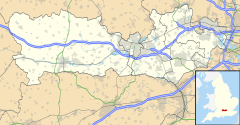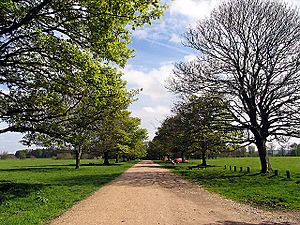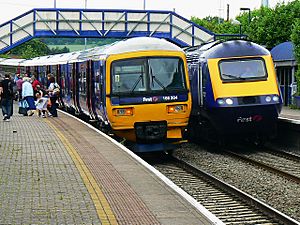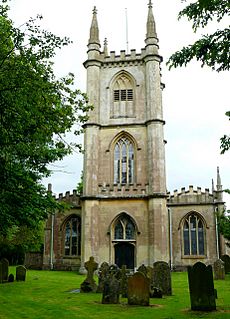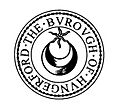Hungerford facts for kids
Quick facts for kids Hungerford |
|
|---|---|
| Town | |
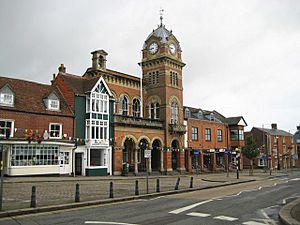 Hungerford Town Hall |
|
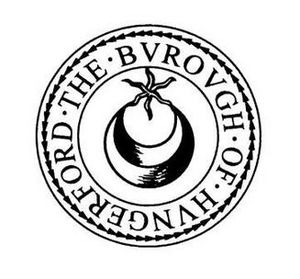 Town symbol |
|
| Area | 27.52 km2 (10.63 sq mi) |
| Population | 5,869 (2021 Census) |
| • Density | 213/km2 (550/sq mi) |
| OS grid reference | SU334681 |
| Civil parish |
|
| Unitary authority |
|
| Ceremonial county | |
| Region | |
| Country | England |
| Sovereign state | United Kingdom |
| Post town | HUNGERFORD |
| Postcode district | RG17 |
| Dialling code | 01488 |
| Police | Thames Valley |
| Fire | Royal Berkshire |
| Ambulance | South Central |
| EU Parliament | South East England |
| UK Parliament |
|
Hungerford is a historic market town in Berkshire, England. It is about 8 miles (13 km) west of Newbury. The town is also 60 miles (97 km) west of London.
The Kennet and Avon Canal flows through Hungerford. It runs alongside the River Dun. This river is a major branch of the River Kennet. Both the canal and river continue east from Hungerford. The town has schools, shops, and places to eat. You can also find facilities for many popular sports here.
Contents
A Look Back at Hungerford's History
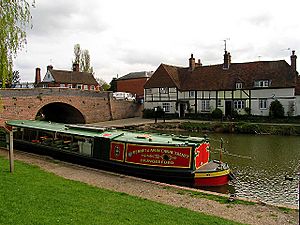
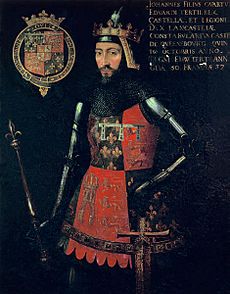
The name Hungerford comes from an old Anglo-Saxon name. It means "ford leading to poor land." A ford is a shallow place where you can cross a river. The town's special symbol is a star and a crescent moon.
Hungerford was not mentioned in the Domesday Book of 1086. This was a big survey of England. Parts of Hungerford were owned by different ancient estates. These estates were on the edge of the royal manor of Kintbury.
Early Growth and Important Figures
In 1118, the land was given to Robert de Beaumont. His family helped the town grow for the next 70 years. By 1241, Hungerford was called a borough. This meant it had some self-governing rights.
In the late 1300s, John of Gaunt became the lord of the manor. This meant he owned the land. He gave the people valuable fishing rights on the River Kennet. The Hungerford family came from this town around 1450.
Hungerford During Wars and Revolutions
During the English Civil War in the 1640s, soldiers often stayed in Hungerford. In June 1644, the Earl of Essex's army spent a night here. Later that year, the Earl of Manchester's cavalry stayed in the town. In November, King Charles I's forces passed through.
In 1688, a big event called the Glorious Revolution happened. William of Orange was offered the Crown of England. This happened while he was staying at the Bear Inn in Hungerford. For many centuries, the land south of the River Kennet was part of Savernake Forest. This changed as more land was farmed in the 1700s.
Geography and Location
Hungerford is located on the River Dun. It is the westernmost town in Berkshire. It sits right on the border with Wiltshire. The town is also within the North Wessex Downs AONB. This is an area of outstanding natural beauty.
The highest point in all of South East England is nearby. It is Walbury Hill, which is 297 meters (974 feet) high. This hill is about 4 miles (6.4 km) from the town center. The Kennet and Avon Canal separates Hungerford from a small area called Eddington. This can be thought of as the town's only suburb.
Hungerford is 60 miles (97 km) west of London. It is also 55 miles (89 km) east of Bristol. The A4 road passes through the town. Hungerford is almost exactly halfway between Newbury and Marlborough. Freeman's Marsh, on the west side of town, is a special nature area. It is called a Site of Special Scientific Interest.
Transport Connections
Hungerford is well-connected by different transport routes. The M4 motorway is nearby, with an exit at Junction 14. The historic Old Bath Road (A4) also runs through the town. The Kennet and Avon Canal opened in 1811.
Hungerford railway station is on the Reading to Taunton line. There are good train services to Newbury, Reading, and Paddington. Because of this, Hungerford has become a "dormitory town." This means many people live here but travel to work in other towns. It has been slowly growing since the 1980s. Many residents travel to nearby towns like Newbury, Swindon, and Reading.
St. Lawrence's Church
The parish church of St. Lawrence is right next to the Kennet and Avon Canal. It was rebuilt between 1814 and 1816. The architect, John Pinch the elder, designed it in the Gothic Revival style. This style brings back elements of medieval Gothic buildings. The church has beautiful stained glass windows. It is also a Grade II* listed building, meaning it is very important historically.
Sports and Fun Activities
Hungerford has many sports teams for young people and adults. There is a cricket team and a football team, Hungerford Town F.C.. They play their games at the Bulpit Lane ground. The town also has a rugby team, Hungerford RFC, and a netball club.
If you like archery, there's the Hungerford Archers club. They practice at the sports field of the John O'Gaunt School. For runners, the Hungerford Hares Running Club started in 2007.
The Unique Hocktide Celebration
Hungerford is the only place in England that still celebrates Hocktide every year. It is also called Tutti Day. This special day happens on the second Tuesday after Easter. Today, it marks the end of the town council's financial year. In the past, it was a bigger celebration. It was linked to the town's important supporter, John of Gaunt.
Some people think Hocktide began after King Alfred defeated the Vikings. On this day, the "Bellman" (or town crier) calls the town's Commoners to a special court. This court is held at Hungerford Town Hall. Two "Tutti Men" and an "Orange Man" visit almost a hundred houses. They are joined by six Tutti Girls from local schools.
Hocktide Traditions
In the past, they collected "head pennies." This was to make sure people kept their fishing and grazing rights. Today, they mostly collect kisses from the ladies of each house! In the court, new town officers are chosen for the year. The town's money is also checked. The court helps manage the town hall, the John of Gaunt Inn, the Common, Freeman's Marsh, and fishing rights in the River Kennet and River Dun.
Local Legends
There is an old story about "Hingwar the Dane." He is better known as Ivarr the Boneless, a famous Viking leader. The legend says he accidentally drowned while crossing the Kennet River here. Some believe the town was named after him. This story comes from a belief that a big battle, the Battle of Ethandun, happened in Eddington, Berkshire. However, most historians now think it happened in Edington, Wiltshire, or Edington, Somerset.
Famous People from Hungerford
Many interesting people have connections to Hungerford.
- Charlie Austin is a well-known footballer.
- Adam Brown is an actor and comedian.
- John of Gaunt, 1st Duke of Lancaster was a son of King Edward III.
- Charles Portal, 1st Viscount Portal of Hungerford was a very important leader in the Royal Air Force during World War II.
- Jethro Tull (agriculturist), a famous agriculturist, died in the town.
- Will Young is a popular singer.
Images for kids
See also
In Spanish: Hungerford para niños
 | Leon Lynch |
 | Milton P. Webster |
 | Ferdinand Smith |


